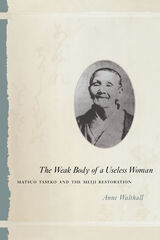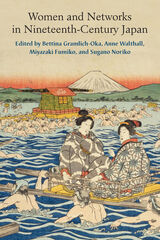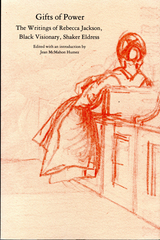4 books about Walthall, Anne

In the Presence of Gods and Spirits
Hirata Atsutane and His Collaborators
Anne Walthall
University of Michigan Press, 2025
In the Presence of Gods and Spirits brings to life the early nineteenth-century Japanese religious leader and scholar Hirata Atsutane, whose fear of Russian incursion onto Japan’s soil led him to redefine what it means to be Japanese. Atsutane advocated the study of the Way of the Gods, commonly known as Shinto, to explain what happens to the soul after death and to cultivate a Japanese identity centered on gods, spirits, and the emperor. His teachings would later attract thousands of followers and feed the movements that led to the Meiji Restoration. Drawing on the concept of material religion, Walthall demonstrates how Atsutane and his collaborators sought out knowledge of the unseen world and educated others, while seeking to bring themselves closer to the gods and spirits. This work showcases Atsutane and his community’s legacy, which has had a profound influence on Japanese society, religious belief, and culture far beyond his lifetime.
[more]

Peasant Uprisings in Japan
A Critical Anthology of Peasant Histories
Edited by Anne Walthall
University of Chicago Press, 1991
Combining translations of five peasant narratives with critical commentary on their provenance and implications for historical study, this book illuminates the life of the peasantry in Tokugawa Japan.
[more]

The Weak Body of a Useless Woman
Matsuo Taseko and the Meiji Restoration
Anne Walthall
University of Chicago Press, 1998
In 1862, fifty-one-year-old Matsuo Taseko left her old life behind by traveling to Kyoto, the old imperial capital. Peasant, poet, and local political activist, Taseko had come to Kyoto to support the nativist campaign to restore the Japanese emperor and expel Western "barbarians." Although she played a minor role in the events that led to the Meiji Restoration of 1868, her actions were nonetheless astonishing for a woman of her day. Honored as a hero even before her death, Taseko has since been adopted as a patron saint by rightist nationalists.
In telling Taseko's story, Anne Walthall gives us not just the first full biography in English of a peasant woman of the Tokugawa period (1603-1868), but also fresh perspectives on the practices and intellectual concerns of rural entrepreneurs and their role in the Meiji Restoration. Writing about Taseko with a depth and complexity that has thus far been accorded only to men of that time, Walthall has uncovered a tale that will captivate anyone concerned with women's lives and with Japan's dramatic transition to modernity.
In telling Taseko's story, Anne Walthall gives us not just the first full biography in English of a peasant woman of the Tokugawa period (1603-1868), but also fresh perspectives on the practices and intellectual concerns of rural entrepreneurs and their role in the Meiji Restoration. Writing about Taseko with a depth and complexity that has thus far been accorded only to men of that time, Walthall has uncovered a tale that will captivate anyone concerned with women's lives and with Japan's dramatic transition to modernity.
[more]

Women and Networks in Nineteenth-Century Japan
Edited by Bettina GRAMLICH-OKA, Anne WALTHALL, MIYAZAKI Fumiko, and SUGANO Noriko
University of Michigan Press, 2020
Although scholars have emphasized the importance of women’s networks for civil society in twentieth-century Japan, Women and Networks in Nineteenth-Century Japan is the first book to tackle the subject for the contentious and consequential nineteenth century. The essays traverse the divide when Japan started transforming itself from a decentralized to a centralized government, from legally imposed restrictions on movement to the breakdown of travel barriers, and from ad hoc schooling to compulsory elementary school education. As these essays suggest, such changes had a profound impact on women and their roles in networks. Rather than pursue a common methodology, the authors take diverse approaches to this topic that open up fruitful avenues for further exploration.
Most of the essays in this volume are by Japanese scholars; their inclusion here provides either an introduction to their work or the opportunity to explore their scholarship further. Because women are often invisible in historical documentation, the authors use a range of sources (such as diaries, letters, and legal documents) to reconstruct the familial, neighborhood, religious, political, work, and travel networks that women maintained, constructed, or found themselves in, sometimes against their will. In so doing, most but not all of the authors try to decenter historical narratives built on men’s activities and men’s occupational and status-based networks, and instead recover women’s activities in more localized groupings and personal associations.
Most of the essays in this volume are by Japanese scholars; their inclusion here provides either an introduction to their work or the opportunity to explore their scholarship further. Because women are often invisible in historical documentation, the authors use a range of sources (such as diaries, letters, and legal documents) to reconstruct the familial, neighborhood, religious, political, work, and travel networks that women maintained, constructed, or found themselves in, sometimes against their will. In so doing, most but not all of the authors try to decenter historical narratives built on men’s activities and men’s occupational and status-based networks, and instead recover women’s activities in more localized groupings and personal associations.
[more]
READERS
Browse our collection.
PUBLISHERS
See BiblioVault's publisher services.
STUDENT SERVICES
Files for college accessibility offices.
UChicago Accessibility Resources
home | accessibility | search | about | contact us
BiblioVault ® 2001 - 2026
The University of Chicago Press









